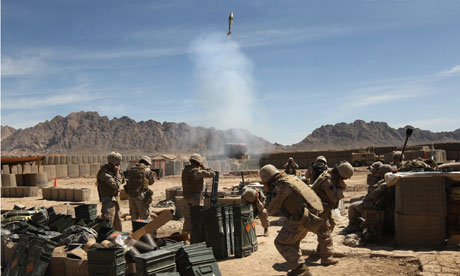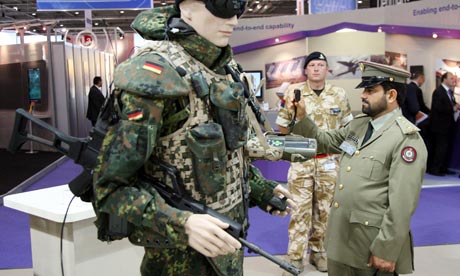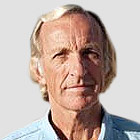Jawed Naqvi in The Dawn
IF one were to anchor a TV programme with the archival revelation that it was Benazir Bhutto who introduced Theresa May’s husband to the future British prime minister at an Oxford reunion ball in 1976, many of us would perhaps happily spend a lot of our precious time glued to the looped and re-looped discussion.
On the other hand, if one were to ask whether Prime Minister May posed a bigger threat to a stable world order than does President Donald Trump it would likely pass for a precipitous canard. This despite that fact that we are ever so often cautioned about the rear view mirror in the car: the objects one sees may be closer at heel than they appear. The warning can be easily applied to international politics.
What we see, or believe we are seeing, can be different from what is afoot. What seems distant or remote could be the trigger for what passes for domestic turbulence. Astute social scientists call it dialectics, whereby everything in the world can be connected with everything else.
Take the poisoning of the double agent Sergei Skripal in Salisbury or consider the latest chemical attack near Damascus in the rebel-held region of Douma. There are legitimate ways of seeing a link between the two. But the way the avenues of news and information have been dumbed down, it would be a challenge to engage an average citizen in a discussion on what to them would be a distant blip on their mirror, if not an imagination of a foggy mind.
So let us quickly come to the facts at hand, and we can crosscheck them too. It is a fact, after all, as distinct from false news, that Trump was elected US president in November 2016. Wasn’t he? Then his election was soon declared to be the handiwork of Russian agents. Right?
Indeed, Trump continued to annoy the deep state. He wanted to befriend Vladimir Putin and questioned the purpose of Nato. He went a step further. He began to question intelligence reports passed to him or leaked to the public.
Then came Theresa May to the rescue of the deep state with its roots on both sides of the Atlantic. When Trump in his pre-political avatar was misbehaving with women, May was already her country’s home secretary. She held that position from 2010 until she was elevated to lead her party and country in July 2016.
Her tenure as home secretary saw the destruction of Libya and the savage assault on Syria. Even more importantly, she was in the cockpit when the Crimea crisis erupted. And she had a good view of it even if she may have been privately appalled at the less than robust response that Nato was willing to offer Russia.
When she became the first foreign leader to visit President Trump on Jan 26 last year, Ms May was nursing another headache on the tour. And so her round trip to the White House included an equally vital stopover in Turkey on the way back. Leaders of both countries on her itinerary were allies of Nato and both were veering perilously close to Vladimir Putin. In a jiffy, she saw the centuries-old British policy of garrotting Russia slipping under her feet.
The mirror on the driver’s side may be telling us to watch out for Donald Trump, who everyone, including most Americans, agrees is speeding ahead rather recklessly on an uncharted trajectory. The mirror on the other side though is showing us a blip, and in a lane where it shouldn’t be. As far as the naked eye can see, the more threatening blip looks like Theresa May. Stated bluntly, Trump may be a decoy.
Double agent Sergei Skripal was swapped by Russia with the US in 2010 and sent for safekeeping to UK. There are some questions about his illness the Russians have asked, including the question: what purpose could it serve to bump off a used- up Russian double agent on the eve of a presidential election, or just ahead of the World Cup that Russia will be hosting? There can be a legitimate suspicion that Skripal and, unwittingly, his daughter fell victim to a strike by someone whose cover Skripal had blown.
But we could also ask, on the other hand, whether it is impossible for another country to replicate the poison that one country has manufactured. The question holds the key when the other side claims to know what that poison is. In other words they have the substance or can produce it to develop an antidote or, why not, to keep it in store for a useful false flag attack. This is not how it happened. This is how some questions come to mind.
A poor scientist died of smallpox in England, after all, when a laboratory accidently released the virus in 1978. The cause of Janet Parker’s infection sent shockwaves through the medical profession. It was reportedly accepted at the time that the virus had travelled through an air duct connecting a smallpox lab with Janet’s office directly above.
To assert that both attacks — in Salisbury and in Douma — can be blamed on Russia, is to state the obvious. A more involved discussion could look at the rise of John Bolton as the new national security adviser to Trump. He has advocated war with Iran, and the alleged Syrian chemical attack may tie up with that objective, as a ruse.
But why has Trump changed his tune on Russia? Has the deep state got the goods on him, in a manner of speaking? If so, Theresa May should have a better grip on the narrative. It was a former British agent in Moscow, after all, whose report is said to have brought the president of the United States to his senses, if that is the word.
'People will forgive you for being wrong, but they will never forgive you for being right - especially if events prove you right while proving them wrong.' Thomas Sowell
Search This Blog
Showing posts with label chemical. Show all posts
Showing posts with label chemical. Show all posts
Tuesday, 10 April 2018
Wednesday, 11 September 2013
The silent military coup that took over Washington
This time it's Syria, last time it was Iraq. Obama chose to accept the entire Pentagon of the Bush era: its wars and war crimes

Children, many of whose deformities are believed to be the results of the chemical dioxin that the US used in the Vietnam war, play outside a hospital in Ho Chi Minh City. Photograph: Paula Bronstein/Getty Images
On my wall is the Daily Express front page of September 5 1945 and the words: "I write this as a warning to the world." So began Wilfred Burchett's report from Hiroshima. It was the scoop of the century. For his lone, perilous journey that defied the US occupation authorities, Burchett was pilloried, not least by his embedded colleagues. He warned that an act of premeditated mass murder on an epic scale had launched a new era of terror.
Almost every day now, he is vindicated. The intrinsic criminality of the atomic bombing is borne out in the US National Archives and by the subsequent decades of militarism camouflaged as democracy. The Syria psychodrama exemplifies this. Yet again we are held hostage by the prospect of a terrorism whose nature and history even the most liberal critics still deny. The great unmentionable is that humanity's most dangerous enemy resides across the Atlantic.
John Kerry's farce and Barack Obama's pirouettes are temporary. Russia's peace deal over chemical weapons will, in time, be treated with the contempt that all militarists reserve for diplomacy. With al-Qaida now among its allies, and US-armed coupmasters secure in Cairo, the US intends to crush the last independent states in the Middle East: Syria first, then Iran. "This operation [in Syria]," said the former French foreign minister Roland Dumas in June, "goes way back. It was prepared, pre-conceived and planned."
When the public is "psychologically scarred", as the Channel 4 reporter Jonathan Rugman described the British people's overwhelming hostility to an attack on Syria, suppressing the truth is made urgent. Whether or not Bashar al-Assad or the "rebels"used gas in the suburbs of Damascus, it is the US, not Syria, that is the world's most prolific user of these terrible weapons.
In 1970 the Senate reported: "The US has dumped on Vietnam a quantity of toxic chemical (dioxin) amounting to six pounds per head of population." This was Operation Hades, later renamed the friendlier Operation Ranch Hand – the source of what Vietnamese doctors call a "cycle of foetal catastrophe". I have seen generations of children with their familiar, monstrous deformities. John Kerry, with his own blood-soaked war record, will remember them. I have seen them in Iraq too, where the US used depleted uranium and white phosphorus, as did the Israelis in Gaza. No Obama "red line" for them. No showdown psychodrama for them.
The sterile repetitive debate about whether "we" should "take action" against selected dictators (ie cheer on the US and its acolytes in yet another aerial killing spree) is part of our brainwashing. Richard Falk, professor emeritus of international law and UN special rapporteur on Palestine, describes it as "a self-righteous, one-way, legal/moral screen [with] positive images of western values and innocence portrayed as threatened, validating a campaign of unrestricted political violence". This "is so widely accepted as to be virtually unchallengeable".
It is the biggest lie: the product of "liberal realists" in Anglo-American politics, scholarship and media who ordain themselves as the world's crisis managers, rather than the cause of a crisis. Stripping humanity from the study of nations and congealing it with jargon that serves western power designs, they mark "failed", "rogue" or "evil" states for "humanitarian intervention".
An attack on Syria or Iran or any other US "demon" would draw on a fashionable variant, "Responsibility to Protect", or R2P – whose lectern-trotting zealot is the former Australian foreign minister Gareth Evans, co-chair of a "global centre" based in New York. Evans and his generously funded lobbyists play a vital propaganda role in urging the "international community" to attack countries where "the security council rejects a proposal or fails to deal with it in a reasonable time".
Evans has form. He appeared in my 1994 film Death of a Nation, which revealed the scale of genocide in East Timor. Canberra's smiling man is raising his champagne glass in a toast to his Indonesian equivalent as they fly over East Timor in an Australian aircraft, having signed a treaty to pirate the oil and gas of the stricken country where the tyrant Suharto killed or starved a third of the population.
Under the "weak" Obama, militarism has risen perhaps as never before. With not a single tank on the White House lawn, a military coup has taken place in Washington. In 2008, while his liberal devotees dried their eyes, Obama accepted the entire Pentagon of his predecessor, George Bush: its wars and war crimes. As the constitution is replaced by an emerging police state, those who destroyed Iraq with shock and awe, piled up the rubble in Afghanistan and reduced Libya to a Hobbesian nightmare, are ascendant across the US administration. Behind their beribboned facade, more former US soldiers are killing themselves than are dying on battlefields. Last year 6,500 veterans took their own lives. Put out more flags.
The historian Norman Pollack calls this "liberal fascism": "For goose-steppers substitute the seemingly more innocuous militarisation of the total culture. And for the bombastic leader, we have the reformer manqué, blithely at work, planning and executing assassination, smiling all the while." Every Tuesday the "humanitarian" Obama personally oversees a worldwide terror network of drones that "bugsplat" people, their rescuers and mourners. In the west's comfort zones, the first black leader of the land of slavery still feels good, as if his very existence represents a social advance, regardless of his trail of blood. This obeisance to a symbol has all but destroyed the US anti-war movement – Obama's singular achievement.
In Britain, the distractions of the fakery of image and identity politics have not quite succeeded. A stirring has begun, though people of conscience should hurry. The judges at Nuremberg were succinct: "Individual citizens have the duty to violate domestic laws to prevent crimes against peace and humanity." The ordinary people of Syria, and countless others, and our own self-respect, deserve nothing less now.
Tuesday, 10 September 2013
Obama's rogue state tramples over every law it demands others uphold
For 67 years the US has pursued its own interests at the expense of global justice – no wonder people are sceptical now
BETA

US troops fire a white phosphorous mortar towards a Taliban position on 3 April 2009 in Helmand province, Afghanistan. Photograph: John Moore/Getty
You could almost pity these people. For 67 years successive US governments have resisted calls to reform the UN security council. They've defended a system which grants five nations a veto over world affairs, reducing all others to impotent spectators. They have abused the powers and trust with which they have been vested. They have collaborated with the other four permanent members (the UK, Russia, China and France) in a colonial carve-up, through which these nations can pursue their own corrupt interests at the expense of peace and global justice.
Eighty-three times the US has exercised its veto. On 42 of these occasions it has done so to prevent Israel's treatment of the Palestinians being censured. On the last occasion, 130 nations supported the resolution but Barack Obama spiked it. Though veto powers have been used less often since the Soviet Union collapsed in 1991, the US has exercised them 14 times in the interim (in 13 cases to shield Israel), while Russia has used them nine times. Increasingly the permanent members have used the threat of a veto to prevent a resolution being discussed. They have bullied the rest of the world into silence.
Through this tyrannical dispensation – created at a time when other nations were either broken or voiceless – the great warmongers of the past 60 years remain responsible for global peace. The biggest weapons traders are tasked with global disarmament. Those who trample international law control the administration of justice.
But now, as the veto powers of two permanent members (Russia and China) obstruct its attempt to pour petrol on another Middle Eastern fire, the US suddenly decides that the system is illegitimate. Obama says: "If we end up using the UN security council not as a means of enforcing international norms and international law, but rather as a barrier … then I think people rightly are going to be pretty skeptical about the system." Well, yes.
Never have Obama or his predecessors attempted a serious reform of this system. Never have they sought to replace a corrupt global oligarchy with a democratic body. Never do they lament this injustice – until they object to the outcome. The same goes for every aspect of global governance.
Obama warned last week that Syria's use of poisoned gas "threatens to unravel the international norm against chemical weapons embraced by 189 nations". Unravelling the international norm is the US president's job.
In 1997 the US agreed to decommission the 31,000 tonnes of sarin, VX, mustard gas and other agents it possessed within 10 years. In 2007 it requested the maximum extension of the deadline permitted by the Chemical Weapons Convention – five years. Again it failed to keep its promise, and in 2012 it claimed they would be gone by 2021. Russia yesterday urged Syria to place its chemical weapons under international control. Perhaps it should press the US to do the same.
In 1998 the Clinton administration pushed a law through Congress which forbade international weapons inspectors from taking samples of chemicals in the US and allowed the president to refuse unannounced inspections. In 2002 the Bush government forced the sacking of José Maurício Bustani, the director general of the Organisation for the Prohibition of Chemical Weapons. He had committed two unforgiveable crimes: seeking a rigorous inspection of US facilities; and pressing Saddam Hussein to sign the Chemical Weapons Convention, to help prevent the war George Bush was itching to wage.
The US used millions of gallons of chemical weapons in Vietnam, Laos and Cambodia. It also used them during its destruction of Falluja in 2004, then lied about it. The Reagan government helped Saddam Hussein to wage war with Iran in the 1980s while aware that he was using nerve and mustard gas. (The Bush administration then cited this deployment as an excuse to attack Iraq, 15 years later).
Smallpox has been eliminated from the human population, but two nations – the US and Russia – insist on keeping the pathogen in cold storage. They claim their purpose is to develop defences against possible biological weapons attack, but most experts in the field consider this to be nonsense. While raising concerns about each other's possession of the disease, they have worked together to bludgeon the other members of the World Health Organisation, which have pressed them to destroy their stocks.
In 2001 the New York Times reported that, without either Congressional oversight or a declaration to the Biological Weapons Convention, "the Pentagon has built a germ factory that could make enough lethal microbes to wipe out entire cities". The Pentagon claimed the purpose was defensive but, developed in contravention of international law, it didn't look good. The Bush government also sought to destroy the Biological Weapons Convention as an effective instrument by scuttling negotiations over the verification protocol required to make it work.
Looming over all this is the great unmentionable: the cover the US provides for Israel's weapons of mass destruction. It's not just that Israel – which refuses to ratify the Chemical Weapons Convention – has used white phosphorus as a weapon in Gaza (when deployed against people, phosphorus meets the convention's definition of "any chemical which through its chemical action on life processes can cause death, temporary incapacitation or permanent harm").
It's also that, as the Washington Post points out: "Syria's chemical weapons stockpile results from a never-acknowledged gentleman's agreement in the Middle East that as long as Israel had nuclear weapons, Syria's pursuit of chemical weapons would not attract much public acknowledgement or criticism." Israel has developed its nuclear arsenal in defiance of the non-proliferation treaty, and the US supports it in defiance of its own law, which forbids the disbursement of aid to a country with unauthorised weapons of mass destruction.
As for the norms of international law, let's remind ourselves where the US stands. It remains outside the jurisdiction of the International Criminal Court, after declaring its citizens immune from prosecution. The crime of aggression it committed in Iraq – defined by the Nuremberg tribunal as "the supreme international crime" – goes not just unpunished but also unmentioned by anyone in government. The same applies to most of the subsidiary war crimes US troops committed during the invasion and occupation. Guantánamo Bay raises a finger to any notions of justice between nations.
None of this is to exonerate Bashar al-Assad's government – or its opponents – of a long series of hideous crimes, including the use of chemical weapons. Nor is it to suggest that there is an easy answer to the horrors in Syria.
But Obama's failure to be honest about his nation's record of destroying international norms and undermining international law, his myth-making about the role of the US in world affairs, and his one-sided interventions in the Middle East, all render the crisis in Syria even harder to resolve. Until there is some candour about past crimes and current injustices, until there is an effort to address the inequalities over which the US presides, everything it attempts – even if it doesn't involve guns and bombs – will stoke the cynicism and anger the president says he wants to quench.
During his first inauguration speech Barack Obama promised to "set aside childish things". We all knew what he meant. He hasn't done it.
Monday, 2 September 2013
Chemical export licences for Syria – just another UK deal with a dictator
Britain is in no position to lecture on human rights when Vince Cable's authorisation follows a long history of arms sales

Defence Systems and Equipment International arms fair at the Excel Centre, Docklands, London. Photograph: Rex Features
The latest revelations about the authorisation of chemical exports to Syria proves that British ministers should avoid two things – lecturing the public on personal morality and lecturing the world on human rights. Both will come back to bite them. While Nick Clegg commented on the pages of the Guardian earlier this year that the UK was a "beacon for human rights", his business secretary was authorising companies to sell chemicals capable of being used to make nerve gas to a country in the middle of a civil war.
Clegg almost certainly knew nothing about the potential sales, and indeed the sales themselves might have been quite innocent, but our history should tell us that precaution is the best principle. If the companies had got their act together to ship the goods to Syria, they would probably have received government support through a unit of Cable's Department for Business, Innovation and Skills, called UK Export Finance. This unit has sold weapons to some of the worst dictators of the past 40 years – and had a role to play in the most serious chemical weapons abuses since the Vietnam war.
Jubilee Debt Campaign has released new information which confirms that the British government effectively armed both sides during the Iran-Iraq war – one of the Middle East's most bloody conflicts.
Britain had been happily selling weapons to Saddam Hussein, our ally during his war against the new Islamic Republic, in the early 1980s. The UK government also allowed the sale of the goods needed to make a chemical plant which the US later claimed was essential to Saddam's chemical weapons arsenal, with the full knowledge that the plant was likely to be used to produce nerve gas. Saddam used chemical weapons against Iranian soldiers and against civilians within his own country in 1988, killing tens of thousands.
This is old news, but we now also know that until the fall of the Shah in 1979, Britain also sold Rapier missiles and Chieftain tanks to Iran's autocratic regime – weapons that were undoubtedly also used in the Iran-Iraq war.
Both sets of arms were effectively paid for by the British taxpayer, as both Iraq and Iran defaulted on the loans given by Britain, and they became part of Iraq and Iran's debt. Though Iran still "owes" £28m to Britain, plus an undisclosed amount of interest, this didn't stop Britain guaranteeing £178m of loans to Iran to buy British exports for gas and oil developments in the mid 2000s, thus breaking its own rules.
This new information adds to a litany of such cases – supporting arms sales to the brutal General Suharto of Indonesia, both Sadat and Mubarak in Egypt and military juntas in Ecuador and Argentina, the latter using its British weapons to invade the Falkland Islands.
In opposition, Cable railed against the use of taxpayer money to support such sales, and his party promised to audit and cancel these debts and stop the sales. In power, he behaves the same way as his predecessors. While regularly claiming such deals are a "thing of the past", Cable has signed off £2bn of loans to the dictatorship in Oman to buy British Typhoon fighter aircraft, the sale of a hovercraft to the highly indebted Pakistan navy and an iron ore mine in Sierra Leone which has not even been assessed for its human rights impact.
Cable has ripped up Liberal Democrat policy to keep on supporting the sale of dangerous goods. He continues to insist on the repayment of debts run up by the UK selling weapons to now deposed dictators. Far from being a beacon for human rights, the UK has little legitimacy around the world when it comes to taking sides in wars – a fact that parliament recognised in its welcome vote last Thursday.
Next week, Britain's true role in the world will be on show in Docklands – when the world's "leading" military sales event meets in London. As war and the aftermath of war still rage across the Middle East, one way we as citizens improve our country's damaged reputation is to protest against such an appalling expression of Britain's role in the world. Authorising the export of chemicals to Syria is simply part of a long trend of support for dangerous technology which undermines this country's legitimacy when it comes to speaking about human rights.
Thursday, 29 August 2013
We should have been traumatised into action by this war in 2011. And 2012. But now?
Robert Fisk in The Independent 29 Aug 2013
Before the stupidest Western war in the history of the modern world begins – I am, of course, referring to the attack on Syria that we all now have to swallow – it might be as well to say that the Cruise missiles which we confidently expect to sweep onto one of mankind’s oldest cities have absolutely nothing to do with Syria.
They are intended to harm Iran. They are intended to strike at the Islamic Republic now that it has a new and vibrant president – as opposed to the crackpot Mahmoud Ahmedinejad – and when it just might be a little more stable. Iran is Israel’s enemy. Iran is therefore, naturally, America’s enemy. So there is nothing pleasant about the regime in Damascus. Nor do these comments let the regime off the hook when it comes to mass gassing. But I am old enough to remember that when Iraq – then America’s ally – used gas against the Kurds of Hallabjah in 1988, we did not assault Baghdad. Indeed, that attack would have to wait until 2003, when Saddam no longer had any gas or any of the other weapons we nightmared over. And I also happen to remember that the CIA put it about in 1988 that Iran was responsible for the Hallabjah gassings, a palpable lie that focused on America’s enemy whom Saddam was then fighting on our behalf. And thousands – not hundreds – died in Hallabjah. But there you go. Different days, different standards.
And I suppose it’s worth noting that when Israel killed up to 17,000 men, women and children in Lebanon in 1982 in an invasion supposedly provoked by the attempted PLO murder of the Israeli ambassador in London – it was Saddam’s mate Abu Nidal who arranged the killing, not the PLO, but that doesn’t matter now – America merely called for both sides to exercise “restraint”. And when, a few months before that invasion, Hafez al-Assad – father of Bashar – sent his brother up to Hama to wipe out thousands of Muslim Brotherhood rebels, nobody muttered a word of condemnation. “Hama Rules,” is how my old mate Tom Friedman cynically styled this bloodbath. Anyway, there’s a different Brotherhood around these days – and Obama couldn’t even bring himself to say ‘boo’ when their elected president got deposed.
So what in heaven’s name are we doing? After countless thousands have died in Syria’s awesome tragedy, suddenly – now, after months and years of prevarication – we are getting upset about a few hundred deaths. We should have been traumatised into action by this war in 2011. And 2012. But now? Why? Well, I suspect I know the reason. I think that Bashar al-Assad’s ruthless army might just be winning against the rebels whom we secretly arm. With the assistance of the Lebanese Hizballah – Iran’s ally in Lebanon – the Damascus regime broke the rebels in Qusayr and may be in the process of breaking them north of Homs. Iran is ever more deeply involved in protecting the Syrian government. Thus a victory for Bashar is a victory for Iran. And Iranian victories cannot be tolerated by the West.
And while we’re on the subject of war, what happened to those magnificent Palestinian-Israeli negotiations John Kerry was boasting about? While we express our anguish at the hideous gassings in Syria, the land of Palestine continues to be gobbled up. Israel’s Likudist policy – to negotiate for peace until there is no Palestine left – continues apace, which is why King Abdullah of Jordan’s nightmare (a much more potent one than the ‘weapons of mass destruction’ we dreamed up in 2003) grows larger: that Palestine will be in Jordan, not in Palestine.
But if we are to believe the nonsense coming out of Washington, London, Paris and the rest of the ‘civilised’ world, it’s only a matter of time before our swift and avenging sword smiteth the Damascenes. To observe the leadership of the rest of the Arab world applauding this destruction is perhaps the most painful historical experience for the region to endure. And the most shameful. Save for the fact that we will be attacking Shiite Muslims and their allies to the handclapping of Sunni Muslims. That’s what civil war is made of.
Subscribe to:
Comments (Atom)


